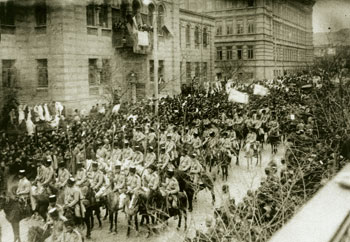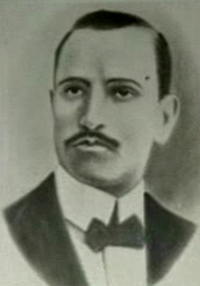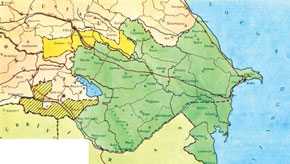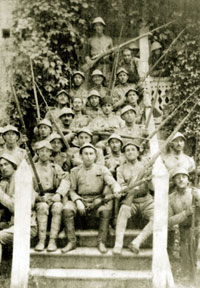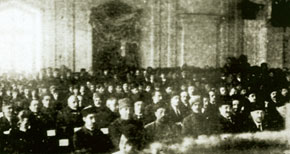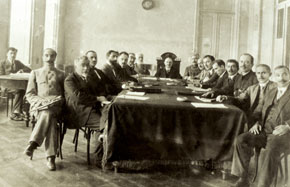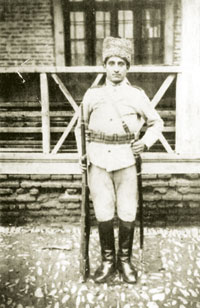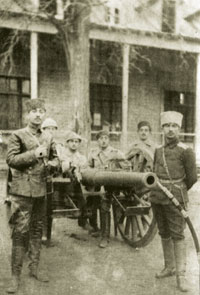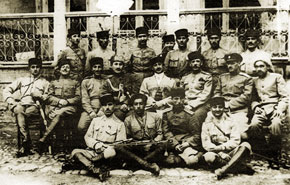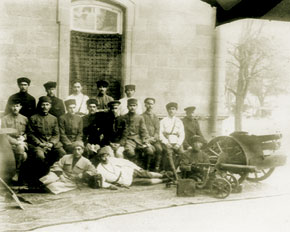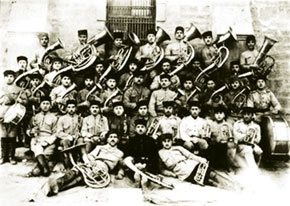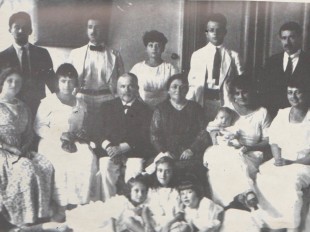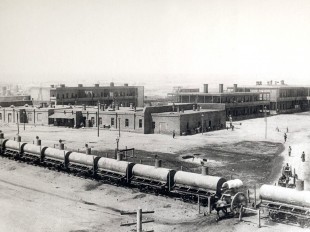The First Mussulman Republic
Pages 28-35
by Scotland Liddell
The Hopes and Fears of the Young Azerbaijan Democratic Republic British journalist Scotland Liddell visited the Caucasus in 1918-20, writing for the British press on the region´s three newly independent republics.
An interview by Scotland Liddell with the minister for foreign affairs of the Azerbaijan Democratic Republic, Mahammad Yusif Jafarov, conducted on 14 October 1919 in Tbilisi, has been found in the Azerbaijani archives (Azerbaijani National Archive Board, collection 970, catalogue 1, file 171). Visions magazine is publishing this fascinating interview to mark the 90th anniversary of the founding of the Azerbaijan Democratic Republic.
Today I have had a long interview with Mr Djafarov, the foreign minister of the Azerbaijan Republic. Mahomed Josev Djafarov (Mahammad Yusif Jafarov) is a young man of about 33, although he impresses one as being very much older than that. A native of Baku, he is a jurist who was educated at Moscow University. He was a member of the Russian Duma, representing part of the Caucasus, and during the Kerensky regime he was a member of the Caucasian Soviet.
At a time when the future of the new Caucasian states is still in the balance, Mr Djafarov´s statements are particularly interesting and I cannot do better than give them here as he spoke them to me.
Pages 28-35
by Scotland Liddell
The Hopes and Fears of the Young Azerbaijan Democratic Republic British journalist Scotland Liddell visited the Caucasus in 1918-20, writing for the British press on the region´s three newly independent republics.
An interview by Scotland Liddell with the minister for foreign affairs of the Azerbaijan Democratic Republic, Mahammad Yusif Jafarov, conducted on 14 October 1919 in Tbilisi, has been found in the Azerbaijani archives (Azerbaijani National Archive Board, collection 970, catalogue 1, file 171). Visions magazine is publishing this fascinating interview to mark the 90th anniversary of the founding of the Azerbaijan Democratic Republic.
Today I have had a long interview with Mr Djafarov, the foreign minister of the Azerbaijan Republic. Mahomed Josev Djafarov (Mahammad Yusif Jafarov) is a young man of about 33, although he impresses one as being very much older than that. A native of Baku, he is a jurist who was educated at Moscow University. He was a member of the Russian Duma, representing part of the Caucasus, and during the Kerensky regime he was a member of the Caucasian Soviet.
At a time when the future of the new Caucasian states is still in the balance, Mr Djafarov´s statements are particularly interesting and I cannot do better than give them here as he spoke them to me.
Founding the republic
"At the present time it is nearly 17 months since the Tartars* of Azerbaijan, bearing in mind the principles of self-determination which followed as one of the results of the Russian revolution, proclaimed their independence and formed the first democratic republic in the history of the Mussulman world. In spite of numerous obstacles, both from within and from without, in the way of state building during the troublous time, the Azerbaijan people have succeeded in securing independence, thus proving their right for that independence, or, in other words, their right for existence.
"We realise very well that when a nation has proclaimed its independence and is anxious that other states should recognize that independence, it is not sufficient to secure inner order but it is absolutely necessary to have outside order as well. Not many weeks ago, the enemies of the Azerbaijan people continually affirmed that order in Azerbaijan was maintained only owing to the presence of foreign troops. All these accusations, however, have been annulled now that the British troops have gone. All representatives of foreign powers in Azerbaijan, and particularly the few British who have remained in Baku, can state that since the departure of the British forces there has been no breach of order. In spite of many provocative rumours and the agitation of numerous ´dark´ elements, no trouble of any kind has occurred to disturb the peace. Thus the Azerbaijan people have already given indisputable evidence to friends and enemies alike of their ripeness for self-administration and for an independent political life.
Foreign policy
"As regards the foreign policy of Azerbaijan, I may say very briefly that we have simply aspired to a friendly peaceful solution of all contestable questions with adjoining nations. We realise that as complete calm in reference to exterior matters is necessary in order that we may build up our new state, the speedy reinforcement of friendly relations with our neighbours will be a pledge for the inner progress of the young Azerbaijan Republic. The Azerbaijan government has always endeavoured to solve peacefully and without force such difficult and complicated questions as, for instance, territorial ones, according to the principles of self-definition of nations, and in particular those questions that concern places of mixed populations."In this last respect, there is a characteristic contrast in the proceeding of the Azerbaijan government on the one hand, and the Armenian government on the other, in regard to frontier territories. As you yourself know very well, enemy agents have for a long time been inciting the people of Karabakh to rise and fight the Azerbaijan authorities. In spite of these intrigues of the enemies of Azerbaijan, however, the government has succeeded in arriving at a peaceful agreement with the Armenian population of Karabakh, which forms the minority of the population of this region and which occupies only the mountainous part of the province. The whole difficulty regarding Karabakh was artificially created by agitators and enemy provocateurs, but in August of this year in Shusha, the 7th Armenian Congress, consisting of Armenian representatives of Karabakh, solved the whole question. Those delegates, free from outside influence, acknowledged the authority of the Azerbaijan government and thus avoided what might have meant a serious struggle involving the death of many men.
Armenians and Muslims
"It is different in other regions remaining under Armenian administration. When supported by armed forces and when the interests of the local population are not taken into consideration, territorial claims cannot at present lead to good steady results. This has been very clearly proved by the events that took place this autumn in the Erivan province on the territory of Sharur-Daralages, Surmalu and Nakhchivan. As is wellknown, those territories are inhabited by Azerbaijan Tartars who form, indeed, 80 per cent of the whole population. Armenians, chiefly concentrated in some towns, form a small minority and from whatever point of view one regards them, they cannot be looked upon as the predominating element in these regions. Nevertheless, the administration was given over to Armenians.
"As far back as the end of last April, the Azerbaijan government foretold that such a solution of the question would result in trouble in a short time. These apprehensions have been realised. The result of the occupation of Mussulman lands by Armenian troops and the Armenian administration´s neglect of the most important needs of the Mussulmans has soon appeared. At the present time the Armenians have been obliged to leave Nakhchivan, the greater part of Sharur-Daralagez and part of the district of Erivan. Moreover, the whole of the Mussulman population in the other regions of Armenia has, owing to the same causes, begun a movement against the Armenians and has risen openly against its oppressors. The misdeeds of the Armenian troops and proceedings of certain Armenian circles have led to excesses against the peaceful Mussulman population and have caused bloodshed which is continuing even now. In this way the hard circumstances of the defenceless Mussulman population are rendered worse.
"Meanwhile, if the Armenian government would only bear in mind a primarily peaceful solution of all contestable territorial questions according to the principle of the self-definition of nations, fresh bloodshed in these already devastated districts would not occur and new causes of antagonism between two neighbouring nations would be avoided. Both peoples are aspiring to resume peaceful work.
"As we desire, if possible, to solve without any acute conflict the question that is inciting the people and that concerns very deeply the Azerbaijan population of Nakhchivan, Sharur-Daralagez, Surmalu and part of Erivan district, our government has at the present time proposed to the Armenian government to establish a provisional demarcation line between Azerbaijan and Armenia, in the hope of finding means to satisfy the local Mussulman population in a way admissible for both nations. The Azerbaijan government is willing, regarding this, to accept the proposal of Colonel Haskell, the allied high commissioner in Trans-Caucasia, as to the settlement of a neutral zone in the above-mentioned regions on certain conditions.
Azerbaijan and Georgia
"The relations of Azerbaijan with Georgia go to prove that this peaceful system of solving all conflicts is the only possible means of arriving at a lasting agreement. The arrangement made with Georgia last June is the base on which the mutual relations of the two republics will be founded, after all the questions that have recently arisen have been solved by means of negotiations and concessions. The joint activity of Azerbaijan and Georgia is a pledge, on the one hand, of closer mutual relations and, on the other, of the securing of their independence which has been won with such difficulty. Mutually supporting each other, those two nations by their joint proceedings against all attempts on their independence and against all attacks of their enemies from within or from without are strengthening the base of the future settlement of the Trans-Caucasian peoples. At the present time when there is a real menace against the independence of both Azerbaijan and Georgia, mutual understanding and mutual support are very important.
The Mountaineers
"The Mountaineer people of the Caucasus, according to their religion, customs and culture, have always been very closely related to the Tartars of Azerbaijan. Dagestan is closely connected with Azerbaijan economically, politically and geographically. The occupation of Dagestan by an army hostile to its people is also a menace to the independence of Azerbaijan. It raises the anxiety and indignation of the Azerbaijan people who are so closely connected with the Mountaineers. The struggle of the latter against the violence of the Volunteer Army that is taking place at present in Dagestan, Ingushetia and Chechnya is naturally arousing great interest and attention here.
The war against Bolshevism
"The proper place for the Volunteer Army is Russia where its chief duty is to fight against the Bolsheviks. Both Azerbaijan and Georgia are keeping outside this great civil war which is taking place in Russia proper. We will on no account tolerate Bolsheviks here, but we are not in a position to take any active part in the Russian war. . Like the new republics of the north and west of the former Russian Empire - Finland, Lithuania, Lettland [Latvia], Estonia and Poland - we will fight only when our enemies threaten our independence. Our position is to remain neutral so long as the Russians act in accordance to the principles of the self-determination of the nations and so long as they do not attempt to impose their authority on nations which have acquired their independence and which have nothing in common with them, not even language or frame of mind. The people of Azerbaijan have already driven out the Bolsheviks and do not intend to participate further in the Russian fighting unless either of the opposing sides attacks them. "Meanwhile, Denikin´s plans and intentions are such as to raise considerable apprehensions as to his assurances of his non-interference with the life of the Trans-Caucasian republics. The unprovoked crushing of the Mountaineers´ Republic, the breach of the demarcation line fixed by the British Command, the aggressive proceedings against Georgia in the district of Sochi, and the perpetual attacks of the Volunteer press against the Caucasian people all prove clearly that the Volunteer Army has hostile intentions towards people who have never given any cause for such an attitude. The Azerbaijan people think that the Allies who support Denikin and who supply him with money and ammunition will not allow that Azerbaijan - this little Caucasian state that is endeavouring to reinforce its independence and to hurry on with the work of reconstruction – be annihilated and that the Volunteer Army should menace its freedom.
The Caspian Sea question
"The handing over of the Caspian Fleet to Denikin surprised us. It is really a threat against the capital of Azerbaijan.
"In future, of course, when the operations against the Bolsheviks are finished, the further existence of a war fleet in the Caspian Sea will be a breach of political equilibrium. The Azerbaijan government hopes that the sea will then be declared neutral and that a commercial fleet only will exist in the Caspian. Such neutralisation would really correspond with the British interests. Great Britain has already taken a firm foothold in the East. The Caspian Sea, therefore, will be in future a great waterway between the East and the West, and the international guarantee of this waterway will be a political necessity for all the nations who are interested in its safety.
"It is in the interests of the British government to preserve the independence of the Trans-Caucasian states so as to make of them a girdle of buffer countries between India and the Middle East and the northern countries. At the present time when Russia, who in the past threatened India, has been driven back beyond the Caucasian mountain chain, the keeping of new ways to the east in neutral hands is the best guarantee of the inviolability of these ways from the attempts of larger powers.
"The Azerbaijan government, recollecting with pleasure its joint work with the British Command in Baku, has great hopes that the question regarding the future fate of the Azerbaijan people will be justly solved by the Allies."
